How Does Alcohol Affect Sleep?
Get Help Now
Many people believe that consuming alcohol before going to bed will sedate them, allowing them to sleep better. Not only is this not the case but drinking alcohol before going to bed can lead to numerous ailments. Alcohol definitely has an impact on your sleep cycle, but how exactly it affects your sleep is a much more complex question. According to numerous experts from drug and alcohol detox Florida centers, three distinct risks are associated with alcohol consumption pre-sleep. In this article, we explore those risks, touch on how alcohol relates to sleep quality, and answer some of the frequently asked questions about alcohol’s connection to our sleep cycle.
How does alcohol affect sleep?
Once alcohol enters our system, it gets absorbed into the bloodstream. The liver then slowly metabolizes alcohol through its enzymes. Before the alcohol can be fully metabolized, it will continue to circulate through the body. The presence of alcohol in the system causes numerous effects, depending on the ingested amount, how quickly it was consumed as well as the person’s physical characteristics (body type, sex, age, overall health, etc.).
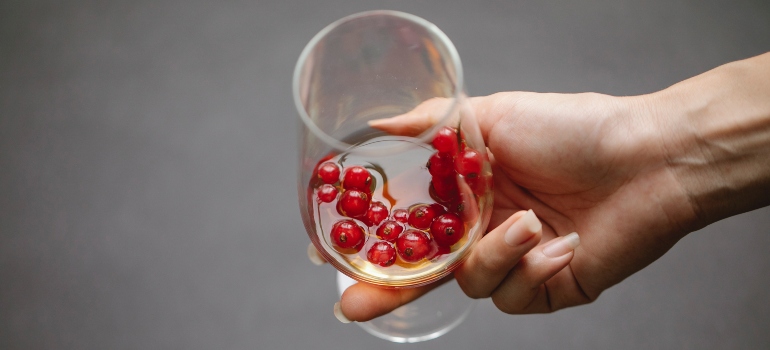
Consuming large quantities of alcohol can be very dangerous. Also, once the alcohol is gone from one’s system, the body may start to experience withdrawal symptoms. This is a very well-known side-effect of drinking, one that many people in our alcohol rehab Lantana center are familiar with.
As for how alcohol affects sleep specifically, there are three major ways in which it does so:
- Alcohol influences the sleep cycles
- It can lead to insomnia
- It increases the risk of sleep apnea
The relationship between sleep and alcohol is an ongoing research topic that started in the 1930s. Since then, research has proved that alcohol, in relation to sleep, has numerous negative consequences and only a single minor positive consequence – an intoxicated individual is usually able to fall asleep more easily. The latter is why many people consider alcohol good for their sleep. However, the fact is that there are a lot of things stirring beneath the surface; things that should deter you from drinking alcohol before going to bed.
Sleep cycles and alcohol
Comprehending how alcohol affects sleep starts with understanding how alcohol interferes with our sleep cycle. A normal sleep cycle involves three NREM (non-rapid eye movement) stages and a single REM (rapid eye movement) stage. What alcohol does is interfere with the REM stage, the most important stage in the sleep cycle. Why exactly is the REM stage so important and in what ways does alcohol consumption interfere with it?
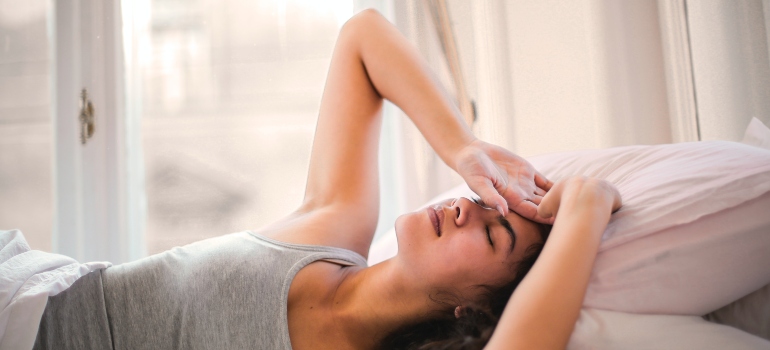
Stage #1 of the sleep cycle (NREM)
The transition from being awake to being asleep. Your body slowly “shuts down” during this stage as your breathing, heart rate, and eye movements slow down. As you fall asleep, your muscles relax, and your brain activity diminishes. This particular stage is often referred to as “light sleep” and is the first NREM stage.
Stage #2 of the sleep cycle (NREM)
During the second NREM stage, your heartbeat and breathing drop even further. During this stage, you are progressing towards deeper sleep. This is usually the longest stage in the sleep cycle during which your body temperature will also decrease.
Stage #3 of the sleep cycle (NREM)
The last NREM stage involves your breathing, heartbeat, and brain activity dropping down to their lowest levels. Your muscles become completely relaxed and your eye movements stop as well. This stage is otherwise known as “slow-wave” sleep.
Stage #4 of the sleep cycle (REM)
This is the singular REM stage in our sleep cycle. It usually takes about an hour and a half to reach this stage, wherein your system will begin to “restart”. Your eye movements will start again and your breathing rate and heartbeat will increase. This stage is also known as the “dream stage”. Neurological studies indicate that the REM stage is very important for our memory and that a lack of it may lead to issues such as memory loss and forgetfulness.
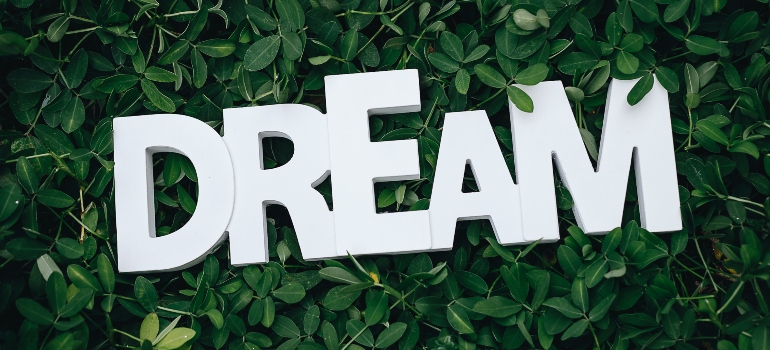
After you go through each stage, the sleep cycle is complete. Generally speaking, each stage lasts anywhere between an hour and a half and two hours, except the REM stage. The REM stage usually lasts for around ten minutes, initially, but it can last for up to 40 minutes or longer in the later cycles.
Alcohol and REM sleep
As mentioned previously, what alcohol does is interfere with the REM stage of the sleep cycle. When you consume alcohol before going to bed, the substance may suppress the REM stage during the first two sleep cycles. This, in turn, creates an imbalance between REM sleep and “slow-wave” sleep, decreasing sleep quality and sleep duration. Alcohol is a sedative, after all, meaning that it reduces the length of the initial phases of sleep and allows you to fall into deep sleep more quickly. This, however, comes at the expense of REM sleep, arguably the most important stage.
Once the body is free of alcohol, the process of falling asleep may last longer but the sleep itself is much more fulfilling. Many people that have completed inpatient alcohol detox center Florida programs experienced and reported that they had never slept better in their life.
Insomnia and alcohol
Aside from interfering with the sleep cycle, alcohol consumption can also lead to insomnia. Insomnia is a medical condition that features persistent difficulty in initiating sleep as well as consolidating it. Needless to say, insomnia drastically reduces the quality of sleep. What usually happens is that people may try “self-medicating” and consuming large quantities of alcohol to help them fall asleep, therefore reducing their REM sleep and causing further sleep disruptions. Alcohol does not usually induce insomnia immediately but rather makes the person feel the symptoms on the following day.
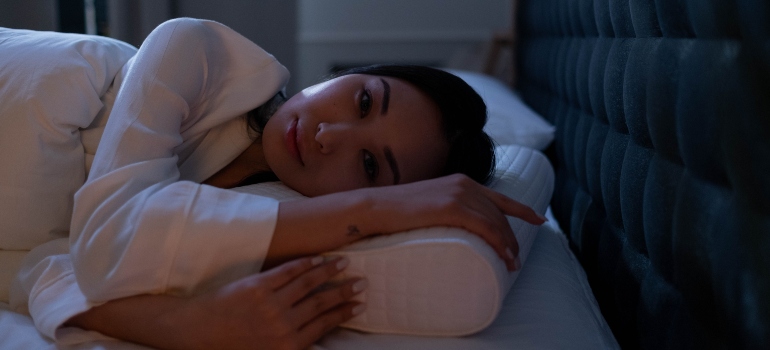
Over time, these sleep irregularities lead to a vicious cycle of drinking alcohol to fall asleep and then using caffeine, energy drinks, and other stimulants to stay awake the following day.
Alcohol dependence may induce insomnia
Lastly, due to increased tolerance to alcohol over time, alcohol abuse often leads to alcoholism, which then results in insomnia. According to NIM research on alcohol dependence, there are multiple connections between alcoholism and insomnia. The research is not fully conclusive, however, as there is a lot of variance between tests. One thing is certain – dependence on alcohol puts you at greater risk of developing this unpleasant sleep disorder.
Sleep apnea and alcohol
Sleep apnea is another very common disorder associated with alcohol consumption. This disorder shows in loss of breath during sleep, resulting in abnormal breathing. As one might imagine, these breathing lapses heavily influence your sleep quality. There are two types of sleep apnea: Obstructive Sleep Apnea (OSA) and Central Sleep Apnea (CSA). The former is brought about by having physical blockages in the back of your throat, while the latter has to do with the brain’s inability to properly signal the muscles involved in the breathing process.
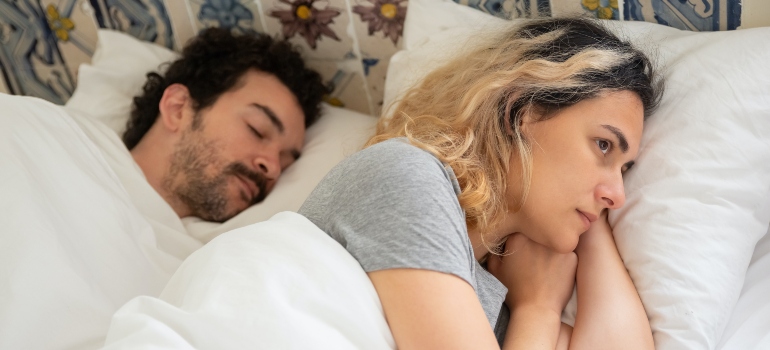
The way alcohol affects sleep and enables sleep apnea is by causing the throat muscles to relax, exacerbating OSA symptoms. Furthermore, consuming alcohol before sleep often leads to heavier snoring, which also disrupts your breathing.
Consuming alcohol will not immediately cause sleep apnea. However, certain studies have shown the risk of developing sleep apnea increases by as much as 25% if you drink before sleeping.
Alcohol and sleep quality
We’ve mentioned sleep quality a few times up to this point – it’s time to explain exactly what it is and how alcohol influences it. Sleep, in its essence, is there to facilitate recovery from both physical and mental fatigue that accumulates throughout the day. Sleep allows us to rest, consolidate our memory, preserve our energy, and enables our growth. With that in mind, poor sleep quality leads to numerous issues such as fatigue, mood disorders, and increased stress levels. Furthermore, poor sleep quality increases the risk of developing cardiovascular diseases, metabolic syndromes, obesity, etc.
Drinking may momentarily increase sleepiness but also causes frequent awakenings during nighttime and early mornings. However, this only applies if you drink alcohol right before sleep. There is no evidence of a correlation between sleep quality and drinking patterns.
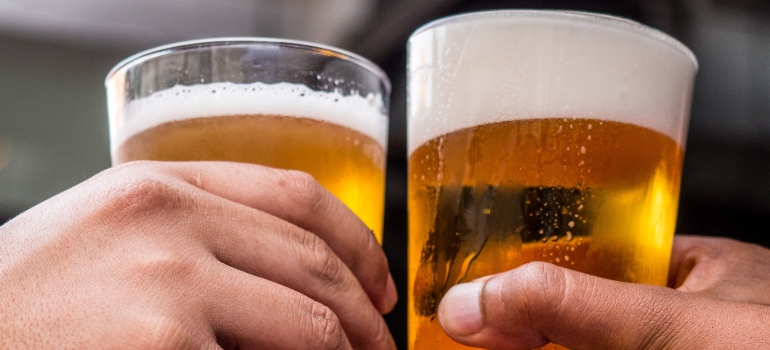
This means that alcohol consumption, in relation to sleep quality, is highly subjective. It all depends on your body and the way that it metabolizes alcohol. And we mustn’t neglect the known fact that alcohol abuse can lead to numerous other mental health conditions such as anxiety and depression. More often than not, heavy drinkers experience frequent bouts of depression which, in turn, influence their sleep quality.
Frequently asked questions on how alcohol affects sleep
Will drinking a small amount of alcohol affect my sleep?
Light alcohol consumption does not have a significant impact on your sleep quality. Some studies show that drinking fewer than two servings per day for men (or one serving per day for women) decreases sleep quality by less than 10%. However, according to the same study, drinking two servings per day (one for women) or more, decreases sleep quality by 24% and 39%, respectively.
When should I stop drinking if I want to maximize sleep quality?
The best thing you can do is to stop drinking altogether, of course. However, drinking alcohol at least four hours before bed will minimize the risk of sleep disruptions. This is subjective and may differ from person to person, but it is always better to err on the side of caution.
Will alcohol help me sleep?
Alcohol has sedative properties, meaning that it will allow you to fall asleep more quickly. However, it will also lead to sleep disruptions throughout the night, creating numerous issues the following day. And there is another danger, as well. By drinking to fall asleep more quickly, you will build tolerance and require ever-increasing amounts of alcohol to fall asleep. Needless to say, this can lead to seriously harmful consequences.
The overall suggestion – avoid drinking pre-sleep
Overall, while the question of how alcohol affects sleep has been researched for decades, connections are still being explored. One thing is certain: alcohol does have negative consequences. The best thing you can do is stop drinking before you go to bed and avoid any of the potential risks. It is, nevertheless, quite risky to attempt doing this on your own; the help of professionals is more often than not – necessary. Get in touch with Archstone Behavioral Health and let us guide and support you through the process.